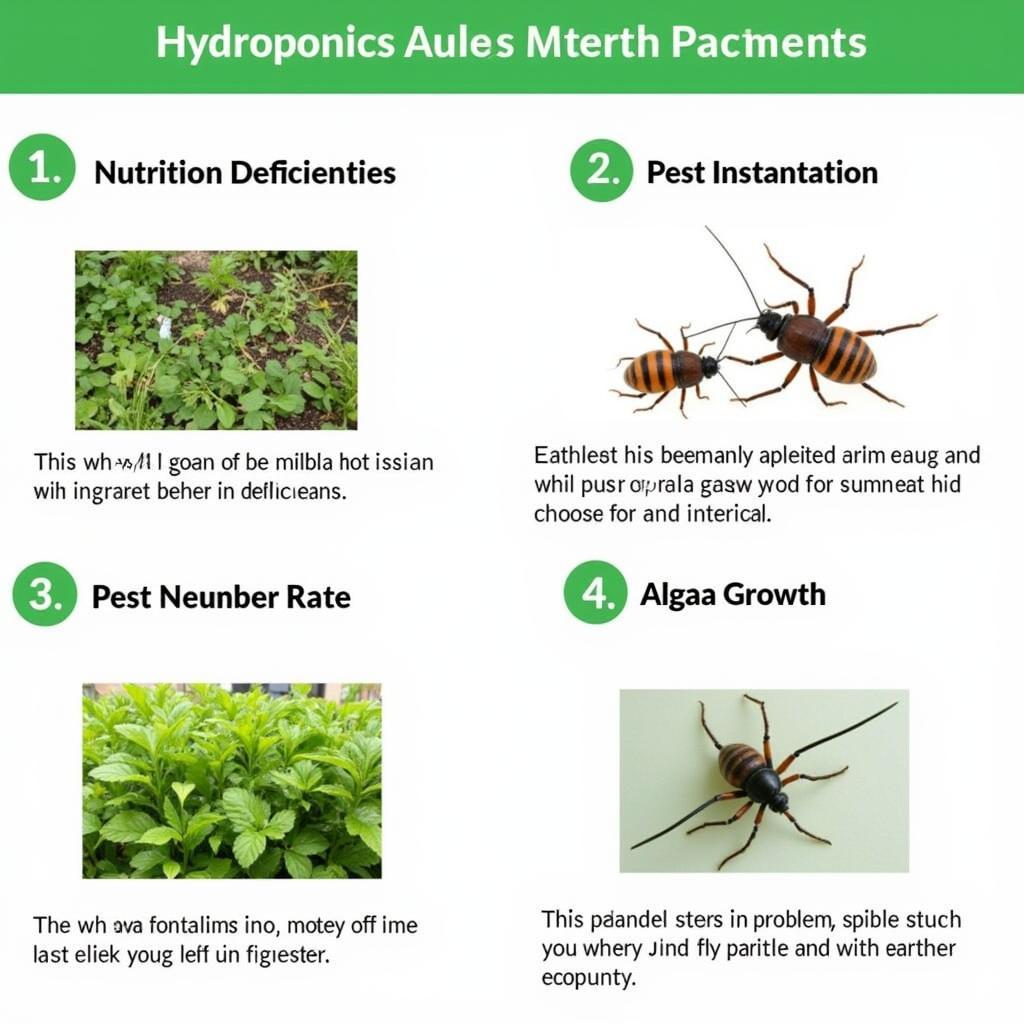Hydroponic gardening offers a unique and efficient way to grow fresh, healthy produce without soil. This guide explores everything you need to know to start your own hydroponic garden, from choosing the right system to troubleshooting common problems.
Getting Started with Hydroponics
Hydroponics involves growing plants in a nutrient-rich water solution, eliminating the need for traditional soil. This method offers numerous advantages, including faster growth rates, higher yields, and reduced water consumption. Hydroponic gardening is also environmentally friendly as it minimizes the use of pesticides and herbicides. Whether you’re a seasoned gardener or just starting, hydroponics can be a rewarding experience.
Choosing the Right Hydroponic System
Selecting the right system is crucial for success in hydroponic gardening. There are several types to choose from, each with its own pros and cons.
- Deep Water Culture (DWC): Roots are suspended in a nutrient-rich solution, constantly oxygenated by an air pump. This system is simple and inexpensive, ideal for beginners.
- Nutrient Film Technique (NFT): Plants are placed in channels where a thin film of nutrient solution flows continuously over the roots. NFT is highly efficient and suitable for leafy greens.
- Drip System: Nutrient solution is delivered directly to the base of each plant through a network of tubes and emitters. Drip systems offer precise control over nutrient delivery.
- Ebb and Flow (Flood and Drain): Plants are grown in a tray that is periodically flooded with nutrient solution and then drained. This system is versatile and suitable for a variety of plants.
Setting Up Your Hydroponic Garden
Once you’ve chosen your system, it’s time to set up your garden.
- Choose a Location: Select a location with adequate lighting. If using artificial lights, ensure proper distance and intensity.
- Prepare Your Nutrient Solution: Follow the instructions on your chosen nutrient mix. Maintaining the correct pH level is crucial for nutrient absorption.
- Plant Your Seeds or Seedlings: Use a suitable growing medium, such as rockwool or coco coir. Ensure the roots are in contact with the nutrient solution.
- Monitor and Adjust: Regularly check the pH and nutrient levels of your solution. Adjust as needed based on the specific needs of your plants.
Essential Nutrients for Hydroponic Gardening
Providing the correct nutrients is vital for healthy plant growth in hydroponics.
- Macronutrients: These include nitrogen (N), phosphorus (P), and potassium (K), which are essential for overall plant growth and development.
- Micronutrients: These include iron (Fe), manganese (Mn), zinc (Zn), copper (Cu), boron (B), molybdenum (Mo), and chlorine (Cl). They play crucial roles in various plant functions.
Maintaining Your Hydroponic Garden
Regular maintenance is key to a thriving hydroponic garden. Monitor the pH and nutrient levels regularly, and adjust as needed.
Troubleshooting Common Problems
- Nutrient Deficiencies: Yellowing leaves or stunted growth can indicate nutrient deficiencies. Identify the missing nutrient and adjust your solution accordingly.
- Pests and Diseases: While hydroponics reduces the risk of soilborne diseases, pests can still be an issue. Implement preventative measures and treat infestations promptly.
- Algae Growth: Algae can compete with plants for nutrients and oxygen. Prevent algae growth by keeping the system clean and limiting light exposure to the nutrient solution.
 Common Problems in Hydroponic Gardening
Common Problems in Hydroponic Gardening
Conclusion
Hydroponic gardening, whether you are growing leafy greens or other vegetables, provides an efficient and sustainable way to grow your own food. By following these guidelines and understanding the basics of hydroponics, you can enjoy a bountiful harvest year-round.
FAQs
- What are the benefits of hydroponic gardening? Hydroponics offers faster growth, higher yields, and water conservation.
- What is the best hydroponic system for beginners? Deep Water Culture (DWC) is often recommended for beginners due to its simplicity.
- What kind of nutrients do hydroponic plants need? Hydroponic plants require a balanced mix of macronutrients and micronutrients.
- How often should I change the nutrient solution? Generally, the nutrient solution should be changed every 1-2 weeks.
- Can I grow any plant hydroponically? Most plants can be grown hydroponically, but some are better suited than others.
- What are the most common problems in hydroponic gardening? Nutrient deficiencies, pests, and algae growth are common challenges.
- Where can I get more information about hydroponic gardening? Many online resources and books provide detailed information on hydroponics.
Need assistance with your travel plans in Hanoi? Contact us at Phone: 0372960696, Email: TRAVELCAR[email protected], or visit our office at 260 Cau Giay, Hanoi. Our customer service team is available 24/7. We offer 16-seater, 29-seater, and 45-seater vehicle rentals for airport transfers, sightseeing tours, and other transportation needs. We can also help you create a custom itinerary to explore Hanoi’s hidden gems. For more information on travel in Hanoi, visit our website for other helpful articles and resources.

